
Ovenbirds or furnariids are a large family of small suboscine passerine birds found from Mexico and Central to southern South America. They form the family Furnariidae. This is a large family containing around 315 species and 70 genera. The ovenbird, which breeds in North America, is not a furnariid – rather it is a distantly related bird of the wood warbler family, Parulidae.

The woodcreepers (Dendrocolaptinae) comprise a subfamily of suboscine passerine birds endemic to the Neotropics. They have traditionally been considered a distinct family Dendrocolaptidae, but most authorities now place them as a subfamily of the ovenbirds (Furnariidae). They superficially resemble the Old World treecreepers, but they are unrelated and the similarities are due to convergent evolution. The subfamily contains 63 species in 16 genera.

Synallaxis is a genus of birds in the ovenbird family, Furnariidae. It is one of the most diverse genera in the family and is composed of small birds that inhabit dense undergrowth across tropical and subtropical habitats in the Neotropical region. Some species show contrasting plumage patterns involving rufous crown and wing patches and black throat patches but they are difficult to see as they keep ensconced in vegetation most of the time. Most species show the long graduated tail with pointy feathers that is typical of spinetails. They are also characterized by constructing large domed nests with stick, including a long entrance tube. Some species can be difficult to distinguish from one another on the basis of their plumage, but can be told apart by their vocalizations, which can be quite distinctive.

Canasteros and thistletails are small passerine birds of South America belonging to the genus Asthenes. The name "canastero" comes from Spanish and means "basket-maker", referring to the large, domed nests these species make of sticks or grass. They inhabit shrublands and grasslands in temperate climates from the lowlands to the highlands. They feed on insects and other invertebrates gleaned from the ground or the low vegetation.
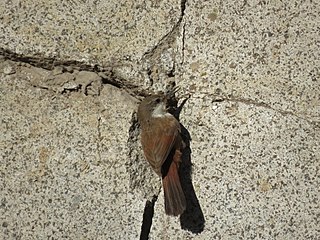
The crag chilia or crag earthcreeper is a species of bird in the Furnariinae subfamily of the ovenbird family Furnariidae. It is endemic to Chile.

The band-tailed earthcreeper is a species of bird in the Furnariinae subfamily of the ovenbird family Furnariidae. It is found in Argentina and Chile.

Neoxolmis is a genus of South American birds in the tyrant flycatcher family Tyrannidae.
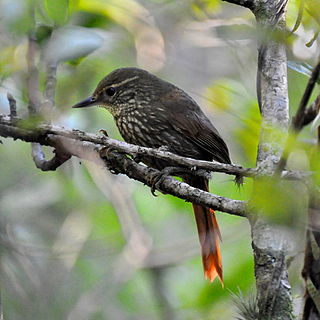
Syndactyla is a genus of foliage-gleaners, birds in the ovenbird family Furnariidae.

The rock earthcreeper is a species of bird in the Furnariinae subfamily of the ovenbird family Furnariidae. It is found in Argentina and Bolivia, and as a vagrant in Chile.

The Chaco earthcreeper is a species of bird in the Furnariinae subfamily of the ovenbird family Furnariidae. It is found in Argentina, Bolivia, and Paraguay, and as a vagrant in Brazil.
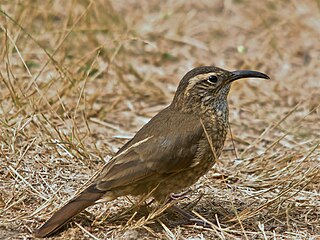
The scale-throated earthcreeper is a species of bird in the Furnariinae subfamily of the ovenbird family Furnariidae. It is found in Argentina, Bolivia, Chile, Peru, and possibly Uruguay.

The Bolivian earthcreeper is a species of bird in the Furnariinae subfamily of the ovenbird family Furnariidae. It is found in Argentina and Bolivia.

The plain-breasted earthcreeper is a bird in the family Furnariidae. It is found in Argentina, Bolivia, Chile, and Peru. Its natural habitats are subtropical or tropical high-altitude shrubland and subtropical or tropical high-altitude grassland. It has been lumped together with the buff-breasted earthcreeper based on song, continuous song, duet, and call.
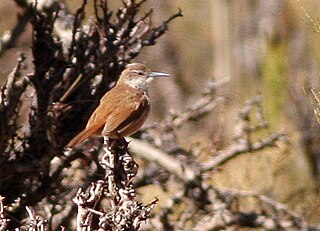
The straight-billed earthcreeper is a species of bird in the Furnariinae subfamily of the ovenbird family Furnariidae. It is found in Argentina, Bolivia, Chile, and Peru.

The striated earthcreeper is a species of bird in the Furnariinae subfamily of the ovenbird family Furnariidae. It is endemic to Peru.

The buff-breasted earthcreeper is a species of bird in the Furnariinae subfamily of the ovenbird family Furnariidae. It is found in Argentina, Bolivia, Chile, and Peru.

The grey monjita is a species of bird in the family Tyrannidae that is the only member of the genus Nengetus. It is found in Argentina, Bolivia, Brazil, Paraguay, Peru, Suriname, and Uruguay. Its natural habitats are dry savanna, subtropical or tropical seasonally wet or flooded lowland grassland, and pastureland.

Ochetorhynchus is a genus of earthcreepers, birds in the family Furnariidae. They are found in open to semi-open habitats in Chile, Argentina, Bolivia and Peru.
The earthcreepers are several South American species of birds in the family Furnariidae:
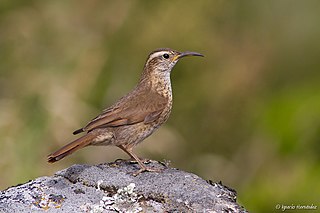
The Patagonian forest earthcreeper, also known as the forest earthcreeper, is a species of bird in the Furnariinae subfamily of the ovenbird family Furnariidae. It is found in Argentina and Chile.



















